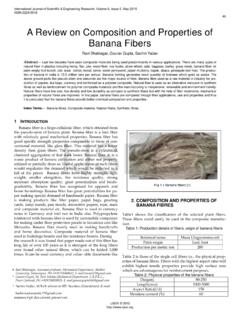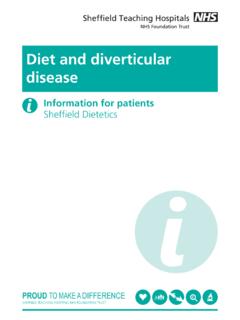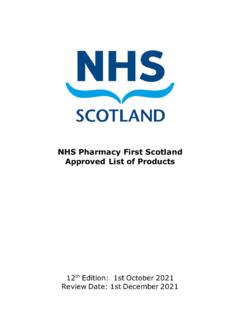Transcription of The Government’s Alcohol Strategy
1 The Government's Alcohol Strategy Cm 8336. The Government's Alcohol Strategy Presented to Parliament by the Secretary of State for the Home Department by Command of Her Majesty March 2012. Cm 8336 Crown copyright 2012. You may re-use this information (excluding logos) free of charge in any format or medium, under the terms of the Open Government Licence. To view this licence, visit open-government-licence/. or e-mail: Where we have identified any third party copyright information you will need to obtain permission from the copyright holders concerned. Any enquiries regarding this publication should be sent to us at: Drugs and Alcohol Unit, 4th Floor Fry Building, Home Office, 2 Marsham Street, London SW1P 4DF.
2 This publication is also available for download at ISBN: 9780101833622. Printed in the UK by The Stationery Office Limited on behalf of the Controller of Her Majesty's Stationery Office ID P002534651 22/03/12. Printed on paper containing 75% recycled fibre content minimum. The Government's Alcohol Strategy 1. PM Foreword Binge drinking isn't some fringe issue, it accounts for half of all Alcohol consumed in this country. The crime and violence it causes drains resources in our hospitals, generates mayhem on our streets and spreads fear in our communities. My message is simple.
3 We can't go on like this. We have to tackle the scourge of violence caused by binge drinking. And we have to do it now. This Strategy sets out how we will attack it from every angle. More powers to stop serving Alcohol to people who are already drunk. More powers for local areas to restrict opening and closing times, control the density of licensed premises and charge a late night levy to support policing. More powers for hospitals not just to tackle the drunks turning up in A&E but also the problem clubs that send them there night after night. And a real effort to get to grips with the root cause of the problem.
4 And that means coming down hard on cheap Alcohol . When beer is cheaper than water, it's just too easy for people to get drunk on cheap Alcohol at home before they even set foot in the pub. So we are going to introduce a new minimum unit price. For the first time it will be illegal for shops to sell Alcohol for less than this set price per unit. We are consulting on the actual price, but if it is 40p that could mean 50,000 fewer crimes each year and 900 fewer Alcohol -related deaths a year by the end of the decade. This isn't about stopping responsible drinking, adding burdens on business or some new kind of stealth tax - it's about fast, immediate action where universal change is needed.
5 And let's be clear. This will not hurt pubs. A pint is around two units. If the minimum price is 40p a unit, it won't affect the price of a pint in a pub. In fact, pubs may benefit by making the cheap alternatives in supermarkets more expensive. We are working in partnership with business on all the proposals in the Strategy , and I am pleased that the drinks industry are playing their part in promoting responsible drinking - including by giving consumers a wider choice of lower strength products and smaller servings to take one billion units out of the market by 2015.
6 Of course, I know the proposals in this Strategy won't be universally popular. But the responsibility of being in government isn't always about doing the popular thing. It's about doing the right thing. Binge drinking is a serious problem. And I make no excuses for clamping down on it. 2. 1. Introduction a new approach Fifty years ago, the United Kingdom had one of the lowest drinking levels in Europe but it is now one of the few European countries whose consumption has increased over that period. Over the last decade we have seen a culture grow where it has become acceptable to be excessively drunk in public and cause nuisance and harm to ourselves and others.
7 In moderation, Alcohol consumption can have a positive impact on adults' wellbeing, especially where this encourages sociability. Well-run community pubs and other businesses form a key part of the fabric of neighbourhoods, providing employment and social venues in our local communities. And a profitable Alcohol industry enhances the UK economy. The majority of people who drink do so in an entirely responsible way, but too many people still drink Alcohol to excess. The effects of such excess on crime and health; and on communities, children and young people are clear.
8 A combination of irresponsibility, ignorance and poor habits whether by individuals, parents or businesses led to almost 1 million Alcohol -related violent crimes1 and million Alcohol -related hospital admissions in 2010/11 alone. The levels of binge drinking among 15-16 year olds in the UK compare poorly with many other European countries2 and Alcohol is one of the three biggest lifestyle risk factors for disease and death in the United Kingdom after smoking and obesity. It has become acceptable to use Alcohol for stress relief, putting many people at real risk of chronic diseases.
9 Society is paying the costs Alcohol -related harm is now estimated to cost society 21 billion annually. The problem has developed for the following reasons: Cheap Alcohol is too readily available and industry needs and commercial advantages have too frequently been prioritised over community concerns. This has led to a change in behaviour, with increasing numbers of people drinking excessively at home, including many who do so before they go on a night out, termed pre-loading'. In a recent study, around two-thirds of 17-30 year olds arrested in a city in England claimed to have pre-loaded'3 before a night out, and a further study found pre-loaders' two-and-a-half times more likely to be involved in violence than other drinkers4.
10 Previous governments have failed to tackle the problem. The vibrant caf . culture, much promised by the previous Government's Licensing Act, failed to 1. Chaplin, R., Flatley, J. and Smith, K. (2011) Crime in England and Wales 2010/11. Home Office Statistical Bulletin 10/11. London: Home Office. Supplementary Table research/research-statistics/crime/crime -statistics/bcs-supplementary-tabs/. 2. Hibell, B. (et al) The 2007 ESPAD report. Substance use among students in 35 European countries. 3. Barton, A. and Husk, K. (forthcoming) Controlling pre-loaders: Alcohol related violence in an English night time economy.












